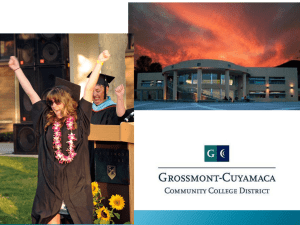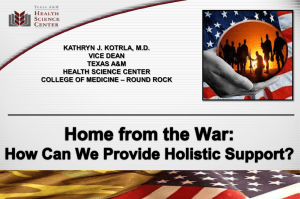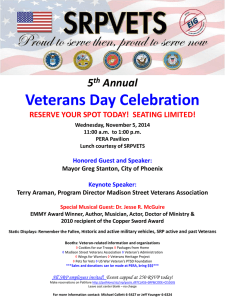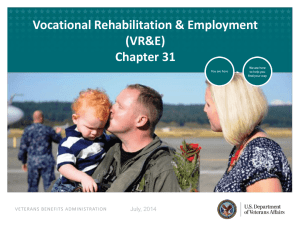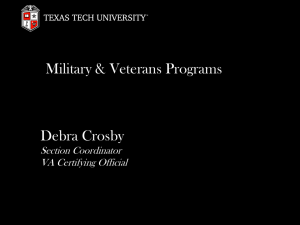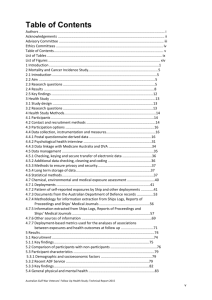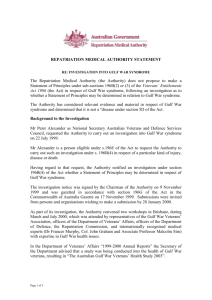Slides - We Honor Veterans
advertisement
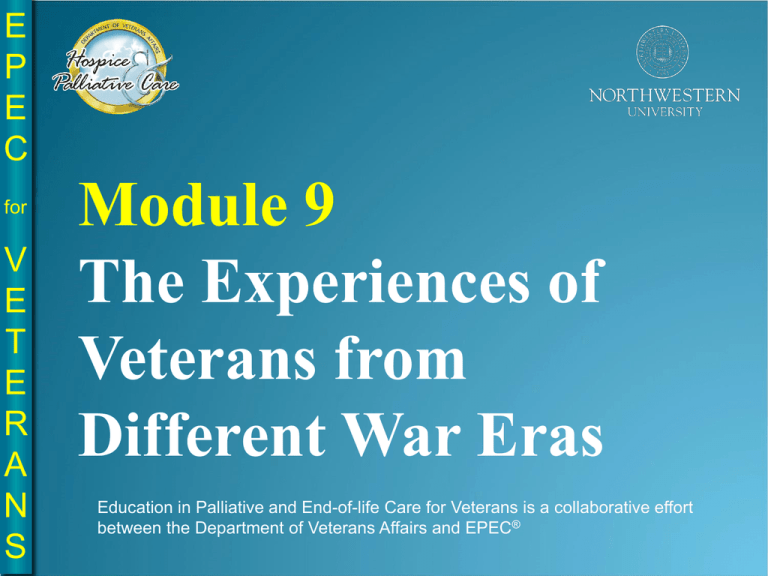
E P E C for V E T E R A N S Module 9 The Experiences of Veterans from Different War Eras Education in Palliative and End-of-life Care for Veterans is a collaborative effort between the Department of Veterans Affairs and EPEC® Objectives Understand the influence of military service in the life of veterans Understand how Veterans’ cultural experience can be a source of strength and meaning Understand how Veterans’ experience might vary based on time and type of service Clinical case Introduction Military service is an acquired cultural experience that continues long after discharge The cultural context of Veterans can have positive and negative impacts on their end-of-life care It can be a source of strength, and a source of distress Experience of service All-volunteer armed forces for 35 years Veterans share the cultural diversity of our country and the common bond of having served Many Veterans seek out Veteran Service Organizations (VSOs) Military history First European settlers lived close to soldiers for protection American Revolution Each generation has war; each generation produces Veterans Military/Veterans often see integration of race, gender, etc. before mainstream society Leaving a legacy Veterans Oral History Project allows archiving of Veterans’ stories More informal methods any clinician can ask: “Tell me about your service” Warrior culture Most new recruits young, fresh out of high school some search for purpose better economic circumstances search for adventure Basic training Turns soldiers into squads privilege, duty, connectedness Initiation into warrior class / stoicism PTSD depression substance abuse Feelings about service Pride Strength of the group Moral ambiguity from wartime actions PTSD guilt / regret Veterans who have seen combat almost all carry some suffering World War II Almost all WWII Veterans > 80 years of age Many died or were wounded Pride in American victory over fascism Segregation Many have injures from combat or environmental exposure radiation mustard gas Korean Conflict Many Americans unfamiliar No clear victory some feel service unappreciated Environmental exposure injuries from extreme heat and cold cold sensitivity Veterans may minimize experiences many relive experiences Cold War Arms race radiation exposure due to above-ground nuclear testing anger / mistrust of government, including VA Every VA has a registry physician Agent Orange Gulf War Syndrome ionizing radiation Vietnam War… Source of much angst for United States Controversial distrust of political leadership first guerilla war hard to separate combatants and civilians soldiers could never let guard down hard to have sense of accomplishment Dissent at home …Vietnam War Great physical, emotional, existential trauma Severely wounded more likely to survive Reintegration difficult alcohol/substance use/abuse many mental health issues, PTSD Agent Orange Hepatitis C traumatic brain injury Persian Gulf War… Many exposed to environmental toxins burning oil fields depleted uranium, etc. multiple vaccinations Gulf War Syndrome memory loss fibromyalgia symptoms no specific test or markers …Persian Gulf War Two conditions correlate with service ALS respiratory problems asthma exposure to high levels of smoke Young age means few need palliative care will change as population ages OEF/OIF Early evidence suggests psychological toll will be worse than physical toll prolonged exposure to combat stress increasing incidence of suicide / attempts depression PTSD traumatic brain injury Summary


